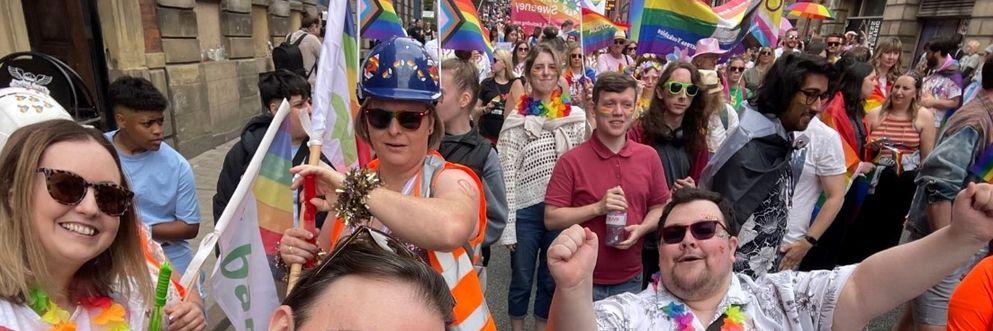
Acceptance, Empowerment, Respect – Why Pronouns Matter
Acceptance, Empowerment, Respect – Why Pronouns Matter
In our everyday conversations, the words we choose can have a profound impact. Among the simplest yet most significant of these are pronouns (he, she, they, ze). I believe that using someone’s correct pronouns isn’t just about following trends; it’s about showing respect. It’s a small act that acknowledges a person’s identity and empowers them to feel seen and valued.
As a member of the LGBTQ+ community, I understand the importance of pronouns on a personal level as it is something that affects many people close to me. I have learned that using the correct pronouns is a straightforward way to affirm someone’s identity and show that I respect who they are. It’s a small shift in language that can make a significant difference in someone’s sense of belonging.
You may have noticed people including their pronouns in their email signatures and wondered why. Pronouns are the words we use to refer to individuals without using their names. They serve a grammatical purpose but also carry personal meaning. When it comes to gender identity, pronouns reflect how someone sees themselves and how they wish to be recognised by others.
I recall a moment of realisation when I heard actor Miriam Margolyes discuss her initial resistance to using they/them pronouns. After a conversation with non-binary actor Zoe Terakes, she reflected, “If you can make someone happy and give them a sense of themselves, then do it!” This openness resonated with me and reinforced the idea that meaningful conversations can shift perspectives.
If you’re wondering how to support the use of pronouns in your everyday life, here are a few tips I’ve found invaluable:
1. Introduce yourself with your pronouns: This simple act helps normalise the practice and creates a safe space for others. Consider adding pronouns to your email signature and LinkedIn profile, at BAM we have just added the functionality for our staff to easily do this.
2. Ask respectfully: If you’re unsure of someone’s pronouns, don’t hesitate to ask politely.
3. Use inclusive language: Try to use terms like “everyone” instead of “ladies and gentlemen.”
4. Correct yourself kindly: If you make a mistake, acknowledge it and move on. Your willingness to correct yourself shows respect and that you’re making an effort.
5. Anyone can be an ally: Allyship is crucial at all times, not just during Pride Month. Supporting one another, regardless of identity, is what truly matters. My great-Auntie Linda is 72 and is a great ally to me, my brother and my cousin, all of us are gay. She’s really breaking down the stereotype of “it’s a generational thing!”
By embracing these practices, we can contribute to a culture of respect and inclusion, where everyone feels valued. As we continue to evolve in our understanding of language and identity, let’s engage in thoughtful discussions that foster understanding and empower all individuals to be themselves.
About the author

Tom Williamson
ICT Support Technician and Chair of Proud@BAM
Tom is an IT Support Professional with 10+ years’ experience and a broad set of skills and expertise from the various industries he’s worked within.
As an ICT Support Technician, Tom’s primary role is to provide support to BAM employees across the UK remotely, and on-site within the North East region.
Outside of Tom's main role he is heavily involved within D&I activities at BAM and is Chair of the Proud@BAM D&I network.


